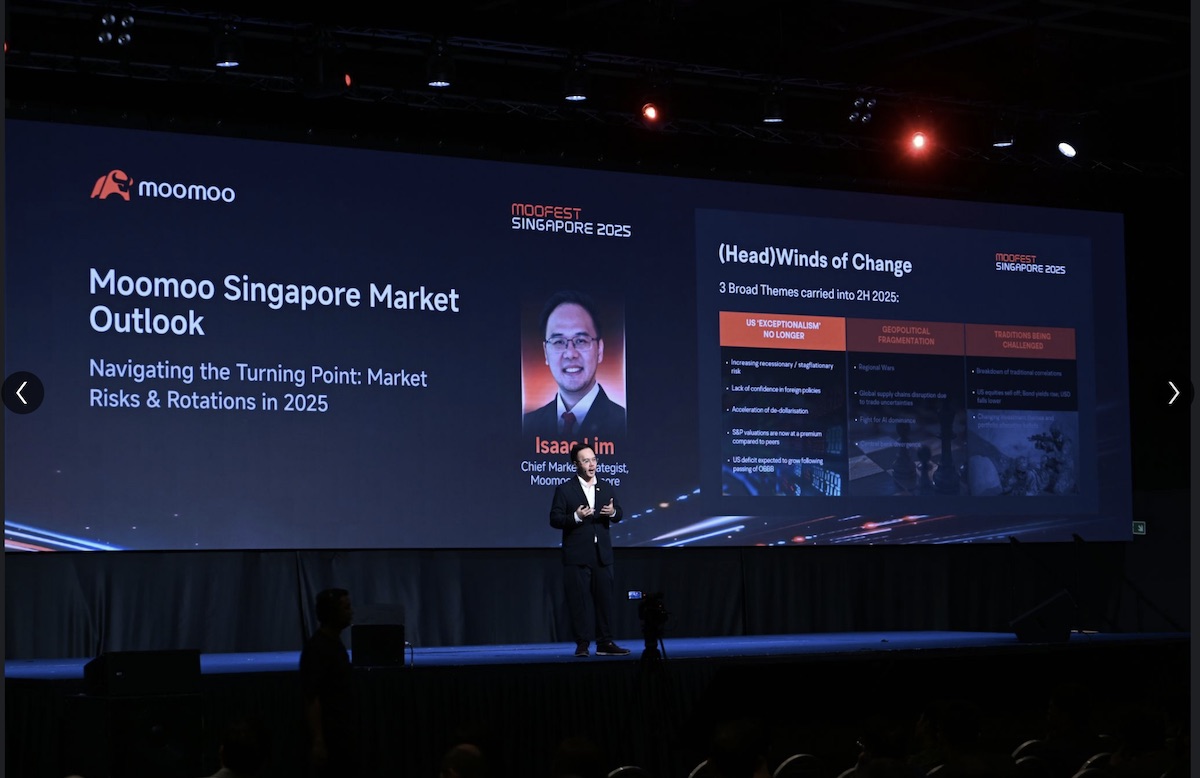4 reasons to revisit Singapore’s stock market
Stocks
Powered by

By Gerald Wong, CFA • 26 Jul 2025
Why trust Beansprout? We’ve been awarded Best Investment Website at the SIAS Investors’ Choice Awards 2025
We spent a Saturday at MooFest 2025 to gain insights into investing in Singapore.

Beansprout is an official media partner of MooFest 2025
What happened?
Singapore’s stock market has long had a reputation for being boring and lacking in breakout potential. We lack a Tesla or Nvidia of our own, and the Straits Times Index (STI) rarely makes global headlines.
But this perception may be due for a rethink.
At the recent MooFest 2025, which brings together Singapore’s investing community for a day of learning, networking and inspiration, a more dynamic picture seems to be emerging.
Across various panel discussions at MooFest 2025, we heard similar sentiments: companies are restructuring, new products are being launched to cater to different investment needs, and more measures have been put in place to revitalise the market.
Here are four reasons shared on why it might be worthwhile revisiting Singapore’s stock market.

4 reasons to revisit Singapore’s stock market
#1 - Local companies are restructuring for growth
It’s easy to dismiss local stocks as mature or stagnant. But many Singapore-listed companies are shifting gears.
In the panel 'Why the Singapore Market Deserves an Allocation in Every Investors Portfolio', SGX market strategist Geoff Howie shared how many firms are actively restructuring to unlock value. This includes initiatives to spin off non-core businesses and recycle their capital to boost returns on equity.
In response, institutional money has been flowing into mid- and small-cap stocks for five straight months, according to data from SGX.
With MAS’ recent announcement of a S$5 billion initiative to back asset managers, there may be even more support for Singapore equities.
Meanwhile, new listings have picked up pace. SGX is building out a SaaS cluster, tapping on momentum from Info-Tech System’s recent initial public offering (IPO) on the mainboard.
#2 - Income remains a strength
Singapore has always been attractive to income investors. Many blue chip stocks offer attractive dividends, including the Singapore banks like DBS and UOB.
Based on the average dividend yield across the last 10 years, the STI offers one of the highest dividend yields when compared with other global market indices.
The average dividend yield of 3.94% across a 10-year period is above the dividend yield of other major indices, such as the Hang Seng Index and the S&P 500 Index.
Index | Average dividend yield over last 10 years |
|---|---|
| FTSE Straits Times Index | 3.94 |
| Hang Seng Index | 3.52 |
| STOXX Europe 600 Index | 3.33 |
| MSCI AC World Index | 2.31 |
| TOPIX Index | 2.14 |
| S&P 500 Index | 1.81 |
| Source: Bloomberg as of 7 August 2024. This chart is purely for illustrative purposes only and not to be relied upon as financial advice in any way. ^Dividend yield of the Straits Times Index is not the same as that of the Nikko AM Singapore STI ETF. Past dividend yields are not indicative of future dividend yields. | |
However, we learnt from MooFest 2025 that income strategies are no longer limited to traditional dividend stocks.
Some REIT ETFs and bond ETFs also have distribution yields that are above the Singapore 10-year government bond yields.
With interest rates declining and macro-economic environment remaining uncertain, these income-generating assets may appear even more appealing to investors.
Related links:
#3 - Home bias can offer a strategic advantage
While many investors believe global diversification is essential, it doesn’t mean the home market should be ignored.
In fact, one of the key arguments at MooFest was that ‘home bias’ can be a strategic edge.
Local investors have the context to better understand local companies, policies, and risks. And they’re not exposed to currency fluctuations in the same way.
Take Japan as an example: its stock market delivered solid returns last year. But for Singapore-based investors, much of that was wiped out by the falling yen.
Singapore equities, in contrast, offer familiarity and currency stability. They can anchor a globally diversified portfolio, balancing overseas risk with local reliability
Check out the following guides to learn more about investing in the Singapore stock market:

#4 - The market offers more than just stocks
The final key takeaway from MooFest: the local market isn’t just about picking individual stocks anymore.
There’s now a wide range of investment tools available:
- ETFs - ETFs tracking broad indices like the STI, or specific themes like sustainability.
- Daily Leverage Certificates (DLCs) - DLCs offer amplified exposure to indices like the NASDAQ, or to single stocks such as the US Magnificent Seven during Asian trading hours
- Singapore Depository Receipts (SDRs) - Allow access to foreign companies listed in Hong Kong and Thailand
According to SGX Head of Equities Ng Yao Loong, SGX and MAS are also working to simplify regulations for complex products, with the goal to make these tools more accessible for everyday investors.
With these options, local investors can now build flexible strategies. Whether they’re focused on income, growth, or short-term macro trends, they don’t need to leave Singapore’s market to pursue do so.
What are some risks to look out for?
While the various panelists shared reasons to consider investing in Singapore, there were also risks that were raised.
Moomoo Singapore's Chief Market Strategist Isaac Lim discussed a few themes that may affect stocks in the second half of 2025.
For example, there is rising recessionary / stagflationary risk, which means that there is a likelihood that US economic growth may slow down, while inflation may remain elevated.
At the same time, there is rising geopolitical fragmentation, as seen in the uncertainty brought about by Trump's tarriffs earlier this year.
As an open economy, Singapore will inevitably be impacted by some of these global developments.
While Singapore stocks have benefited from safe-haven flows amid the heightened uncertainty so far, a sharp escalation in trade tensions or significant economic downturn may still impact the performance of Singapore stocks.

What would Beansprout do?
At Beansprout, we’re always on the lookout for ways to share valuable financial insights with our readers.
MooFest 2025 provided a wealth of information and expert insights that offered opportunities for us to think about how to position our investment portfolios.
In particular, many of the panel discussions focused on why Singapore’s market deserves to be taken more seriously by investors.
There are companies restructuring for growth, new products launched to broaden investor access, as well as ample income opportunities even as interest rates decline.
At the same time, we’d stay mindful of the risks ahead from global trade tensions to a potential slowdown in the US economy.
As always, diversification, discipline, and clarity around your investment goals will go a long way.
If you are keen to start investing in the Singapore market, you can start with a stock brokerage account that offers access at a low cost.
At MooFest 2025, Moomoo Singapore also announced that it has crossed 1.5 million users in Singapore. That means 1 in 2 Singapore residents aged 20 to 70 has a stock brokerage account with Moomoo Singapore. Read our review of Moomoo SIngapore here.
Ready to start your investing journey? Sign up for a Moomoo SG account here.

Moomoo Exclusive Promotion
Learn more about the Moomoo promotion here
Related articles:
- Moomoo Income Plus: Generate income on your idle cash
- How I started investing in US stocks with Moomoo Singapore
Join the Beansprout Telegram group for the latest insights on Singapore stocks, REITs, bonds and ETFs.
All views expressed in the article are the independent opinions of Beansprout. Neither Moomoo Singapore or its affiliates shall be liable for the content of the information provided. This advertisement has not been reviewed by the Monetary Authority of Singapore.
This article contains affiliate links. Beansprout may receive a share of the revenue from your sign-ups to keep our site sustainable. You can view our editorial guidelines here.
Read also
Most Popular
Gain financial insights in minutes
Subscribe to our free weekly newsletter for more insights to grow your wealth
Comments
0 comments
